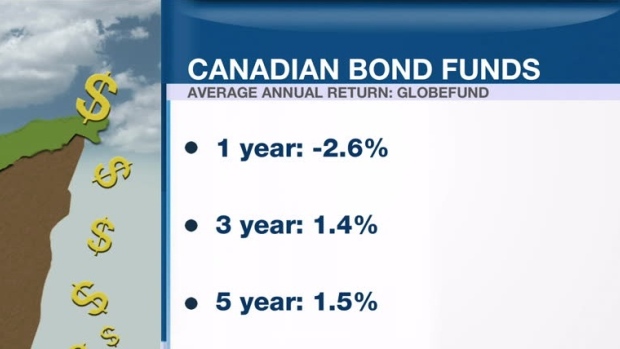Oct 27, 2017
Personal Investor: Bond funds could be draining your retirement savings
By Dale Jackson
It’s ironic that investors believing their money is safe in bond funds are actually risking their retirement savings.
Fixed income is a vital cushion for any portfolio to counter the risk from the equity portion, no matter how paltry bond yields may be right now. As you get older, and capital preservation becomes more important, the fixed-income portion of your portfolio should grow to provide a reliable income stream in retirement.
The need for fixed income is a given, but some investment advisors fill that need with bond funds. That hasn’t worked out so well. According to Globefund the average Canadian fixed-income fund has actually lost 2.6 per cent over the past year. Over the past five years, the average fixed-income fund has returned a measly 1.5 per cent annually. Returns vary from fund to fund, which is another layer of risk considering a basic guaranteed investment certificate (GIC) yields about two per cent – guaranteed.

The culprit is fees, which could be as high as three per cent annually. Without the fee, also called a management expense ratio (MER), most money-losing funds would have been in the black.
So, why don’t investment advisors just put their client’s money in GICs? Typically one per cent of that MER compensates the advisory firm as a commission. Let’s say you have a one million dollar portfolio and half of that is in a fixed income fund; that’s $5,000 each year out of your portfolio.
Under new disclosure rules known as CRM2, that dollar amount must be revealed to clients, but there could be a sinister twist. The highest-fee bond funds are segregated funds – insurance products wrapped in a mutual fund that guarantee the principal over a set period of time. As insurance products, segregated funds are exempt from the CRM2 disclosure rules – presenting the opportunity for advisors to hide the dollar amount by putting their clients in segregated funds.
To further muddy the waters, many investment advisors that recommend mutual funds are actually salespeople who are only qualified to sell mutual funds.
If you are in a bond fund, ask your advisor why. If they are qualified to put your money in real fixed-income products with lower fees, develop a plan to build a fixed-income portfolio.
If your advisor is not qualified, consider finding one that is.






